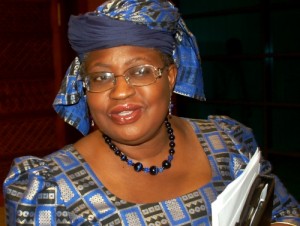Why Must Okonjo-Iweala Be the Scape Goat? – By Olusola Daniel
Articles, Columnists, Daniel Olusola, NNP Columnists, Women Politics Friday, April 8th, 2016By Olusola Daniel | Lagos, Nigeria | April 8, 2016 – “The immediate past Minister of Finance, Ngozi Okonjo-Iweala, illegally approved the transfer of at least N61.4 billion ($300 million and £5.5 million) from funds recovered from late dictator, Sani Abacha, to the Office of the National Security Adviser, Sambo Dasuki, few weeks to the 2015 presidential election…” Those were the words of Nigeria’s online news platform, Premium Times on December 9, 2015 on the controversial diversion of security funds by the office of the National Security Adviser (NSA).
Since the issue of the alleged $2bn loot recovery by this present administration came to the fore, Nigerians have been grossly entertained by the principal actors in the macabre dance that would have probably been fit for Nollywood but which unfortunately happens to be “based on true life stories”. It is spinning into a long series (or is it seasons now?) especially by the protagonists of the State who are overzealously bent on acting out a script in order to receive lead roles in other subsequent movies as written by the democratic dictator, the writer, director and producer of the movies.
The question of the role of former Minister of Finance and Coordinating Minister of the Economy, Mrs Ngozi Okonjo-Iweala in Jonathan’s administration has again gotten the attention of this writer. Let us be quick to admit the fact that like all mortals, Ngozi has her own faults too. This writer thinks her fault perhaps was her being too professional in her job. Before you crucify me, let me explain what I meant by my last statement. This write-up is about the role of professionals in government which must lead us to confront the prevailing and competing conceptions of governance as well as to examine what we understand to be professionals in government.
We live in a society that typically compares professionals in government to politicians in government. We seem to entertain a false dichotomy between professionals who are credited with expertise in public policy and the mechanics of governance on one hand, and on the other hand politicians who are often perceived as mere jobbers trawling through public life for position and power, and who are mainly motivated by the possibilities of self-aggrandizement.
While a problem-solving ethic is attributed to professionals, politicians are seen as Janus-faced, opportunistic and self-serving. The devaluation of public service and politics owes something to this perception. This popular perception has made it difficult to understand and mitigate the often unhealthy rivalry that exists between these two important cadres of public officials who are supposed to be operating collaboratively in the public space for the common good.
The origin of the commonly held concept of professionals or technocrats in government can be traced back to the mid-1980s when technocrats supported by Western donors and the Bretton Woods institutions, came to power in a number of African nations. The belief in these financial institutions was that these technocrats in African governments, being impartial empiricists, would unsentimentally deliver sustained economic growth and development through trade liberalization and structural adjustment programmes, thereby bringing about political stability and economic growth.
The failures of the policies of that era owe largely to the fact that while the technocrats enjoyed foreign backing, they had little local support because they were ill-prepared to manage the expectations and frustrations of the people who were reeling under the effects of structural adjustment programmes and other anti-people policies of that epoch. The failings of the technocrats brought their inadequacies to the fore and showed them to be professionals who were experienced and skilled in the technical requirements of their jobs but who lacked the know-how in people management needed to succeed in public office.
If the problem most people have with Madam Ngozi is being highly professional, then I suggest they purge themselves of professional phobia. There is nothing so far in the whole affair now linked with the Jonathan’s administration.
Let us even admit for the sake of argument that Okonjo-Iweala is “guilty by association” working for Jonathan. It is on record that President Buhari worked in a capacity with the notorious regime of General Sani Abacha. Wait a minute, can we blame Buhari for the corruption or the brutalities of the Abacha regime?
By way of inference, let us not forget that Okonjo-Iweala worked as a professional in government. As a professional she is required by the ethics of her profession to do things the right way not to engage in unnecessary politicking.
After all, we all recall Buhari in the ‘90s publicly saying that Abacha was not corrupt because the allegations against him have not been proven. With the “Abacha loot” becoming a point of contention, can we still call him a saint? If we cannot hold Buhari accountable for Abacha’s crimes, why should Okonjo-Iweala be the scapegoat for Jonathan’s alleged crimes? I leave you with your conscience to answer this!
Olusola Daniel wrote from Lagos, Nigeria.wp_posts
Related Posts
- Tinubu and the Creation of a New Society – By Abiodun Komolafe
- [Video] Japa: Nigerians relocating abroad to take up jobs they reject at home – First Lady Oluremi Tinubu
- Embracing Invincible Defense Technology for Lasting Peace – By Dr. David Leffler
- Insecurity: Time to Heed Zulum’s Warning – By Abiodun Komolafe
- Tinubu cancels 40% IGR deduction policy for federal universities
Short URL: https://newnigerianpolitics.com/?p=45168

































